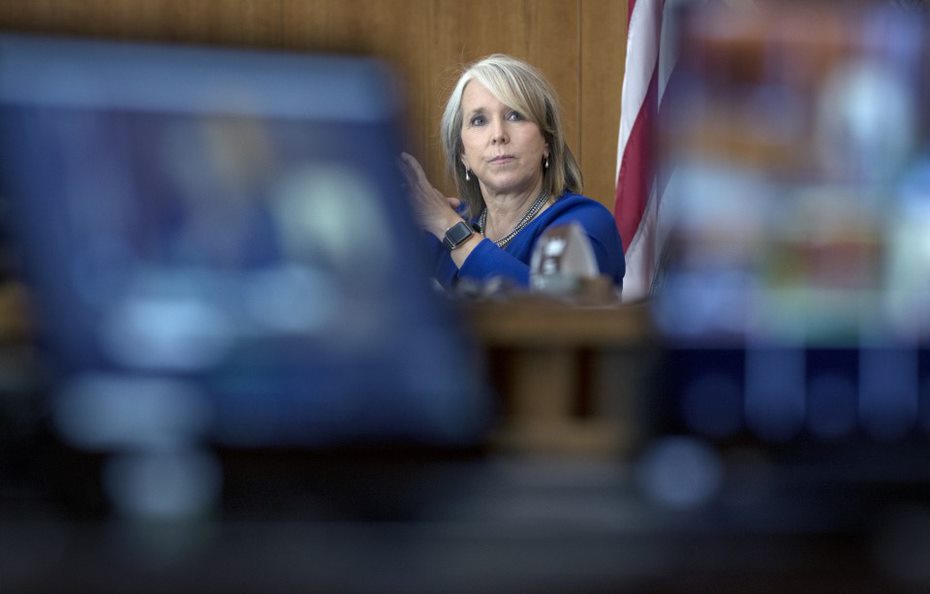Governor Raises Pay of Medicaid Director by $79,976, Who Plans Real Cuts of Funds for 1,200 of Most Vulnerable on DD Waiver



Dana Flannery Plans to Cut Funds for 1,266 of the Most Vulnerable Recipients of the DD Waiver – Further Harming Already Tenuous Workforce Retention/Recruitment Efforts.
On February 29, thirteen months after the departure of the previous state Medicaid Director, Human Services Department Secretary Kari Armijo announced Governor Michelle Lujan Grisham’s decision to appoint Dana Flannery to fill the vacancy.
“I look forward to working closely with Dana in her new capacity and am excited to see the innovations and advancements she will bring to our Medicaid program,” Armijo wrote in a press release.
Flannery, who came from the Arizona Health Care Cost Containment System, took the job after the Governor agreed to pay her $210,000 a year (just shy of an $80,000 increase over the old director).
The HSD announcement contained this comment from the new Director of Medicaid:
“I’ve found my passion in Medicaid … I believe accessible and comprehensive health care is a fundamental human right, and I am profoundly grateful that I get to play some small part in making a positive impact on individual well-being.”
Given those statements, it is easy to understand the angst of advocates for some of the most medically and developmentally vulnerable residents of the state, when Flannery released her proposed amendment to the Developmental Disabilities Waiver Program.
The “innovations an advancements” proclaimed by Armijo, and Flannery’s “compassion” and pronounced belief in “comprehensive health care as a fundamental right,” do not square with the reality contained in New Mexico’s “Request for an Amendment to a §1915(c) Home and Community-Based Services Waiver.”
The Proverbial Shell Game: State Officials Call It a Rate Increase … As They Pay Less.
Flannery and her employees at the newly minted Heath Care Authority are spinning the amendment as a rate increase, downplaying the fact that with the elimination of an existing federal allocation representing a 5% boost on June 30, 2024, the REAL payments for at least two critical DD Waiver component services will be reduced under Flannery’s plan.
The reduction in real payments will impact as many as 1,266 DD Waiver Clients – and they are amongst clients with the most severe conditions.
Those reductions fly in the face of a study that shows insufficient funding of the DD Waiver programs in New Mexico has adversely impacted the availability of direct care givers.
The amendment needs the consent of the federal government’s Centers for Medicare & Medicaid Services, to implement the changes. The federal government pays for about 74% of the cost of the care provided through the DD Waiver, and the state of New Mexico pays for the balance.
Insufficient Workforce Frustrates Advocates
While the Lujan Grisham Administration claims that New Mexico no longer has a wait-list for DD Waiver services, the reality is many are waiting for vital services for which the list of professionals available to provide the services is shrinking.
Representative Liz Thomson, herself the mother of a son with developmental disabilities, recently expressed frustration that while the waiver wait list may have disappeared on paper, in reality people were still not receiving services.
“There aren’t services available. You may get a spot on the Waiver, but if there’s no PT [physical therapists – for example] to provide the service, you’re not on the Wait list, but you’re also not getting services. Workforce, once again strikes,” Thomson stated a a meeting of the Legislative Health and Human Services Committee.
Thomson’s appraisal reflects the frustration of many Developmental Disabilities Waiver clients, their families, and guardians of clients.
In the last two years, more providers of services have been turning down new clients due to the inability to retain and recruit sufficient staff to provide safe care.
They say, “the devil is in the details.”
That is certainly the situation with the New Mexico Request for an Amendment to a §1915(c) Home and Community-Based Services Waiver.
Buried in pages 234 through 247, of the proposed amendment, are the rates for the current fees paid for Supported Living, Category 4 Extraordinary Medical/Behavioral Supports services and Intensive Medical Living services … and the new amounts proposed by Flannery.
The numbers don’t lie … the fees for at least these two critical services will be dropping 4% to 5% – negatively impacting the number of available venues for the care of an increasing number DD Waiver clients needing these services.
The amendment document also provides evidence that the number of New Mexicans needing those services will increase from 1,001 to 1,198 for Supported Living, Category 4 Extraordinary Medical/Behavioral Supports services; and from 56 to 68 individuals in need of Intensive Medical Living services.
Provider agencies have been complaining for years that rates are woefully insufficient and inhibit their ability to retain and recruit sufficient staff.
As a result, providers have limited the availability of their services and many have declared self moratoriums on acceptance of any new clients.
A study released last September, and conducted for the state by the Public Consulting Group (PCG), entitled, “New Mexico DDSD Provider Capacity Assessment Report,” confirmed what most stakeholders (clients, parents of clients, provider agencies and advocates) already knew through personal experience: that rates are directly related to fixing and expanding services.
Specifically, the PCG report revealed providers have limited the availability of their services and many have declared self moratoriums on acceptance of any new clients.
Some key take-a ways from the PCG study report:
- There were 15 counties with no openings,
- A high proportion of providers are on self-imposed moratorium,
- Staff leaving provider agencies,
- A significant number of providers not accepting new participants,
- Supported Living was identified as “Not Always Available” by 26% of case managers. and
- Supported Living had the highest number of Regional Office Request for Assistance of any service for the Developmental Disabilities Waiver.
Despite the September PCG report’s linking rates to the ability of provider agencies to retain and recruit staff, and provider agencies self-imposing moratoriums on their services, the HSD is seeking approval of rates that likely will be decreased from this year for supported living for those needing extraordinary medical and/or behavioral services and intensive medical living services.
The New Mexico Legislature provided funding for what they believed would be an increase in fees paid for the services in the DD Waiver.
To be clear, there are fee increases for some related services in Flannery’s proposed amendment – but there is a significant decrease from the amount of funds being paid today for supported living for those needing extraordinary medical and/or behavioral services and intensive medical living services.
The following is being reported due to a belief that people in government service have a responsibility to be transparent and provide the public with answers to questions about how their government works … or doesn’t.
The Run Around…
As The Candle reported at the end of May, Flannery’s proposed Developmental Disabilities Waiver Amendment “is seeking approval of rates that likely will be decreased from this year for supported living for those needing extraordinary medical and/or behavioral services and intensive medical living services.”
A week ago, The Candle emailed the the HSD Communications Director, Marina Piña, Jennifer Rodriguez (Acting Director of the Developmental Disabilities Supports Division), and Melanie Buenviaje (Bureau Chief, Exempt Services and Programs Bureau), writing the following:
“… According to sources, we are being told that the HSD and DDSD are now suggesting that at least some of the proposed rates HSD has included in the proposed Amendment are wrong. The Candle would like to update our reporting if you or someone at HSD or DDSD could clarify what we are hearing regarding the agencies’ rate proposal.”
Ms. Rodriguez and Ms. Buenviaje, along with Director Flannery, are the three state employees listed on the draft amendment as contacts.
After receiving no response to the email, The Candle called Director Flannery on her cell phone, apologizing for calling her on a Saturday, but explaining that Ms. Piña never responded to our email. She indicated that she would have a response to our queries by Monday.
She also asked that we call her at her office number.
No one from HSD responded on Monday.
On Tuesday, an attempt was made to reach Director Flannery at the number listed on the draft amendment as her contact phone number.
The number is no longer operational according to the recording. (Hopefully no one from CMS needs to reach Flannery.)
After texting Director Flannery, about not receiving the response promised, she texted back, “Please follow the process and contact the HSD CIO...”
The HSD CIO is Marina Piña, the person we originally contacted … and who finally responded, stating that we should file an Inspection of Public Records Act request.
As she already knew, we had a copy of the document. We were seeking a statement of clarification about the DD Waiver document, which is something that is within the responsibility of Ms. Piña to seek from her agency and provide to the public.
She never provided a response to the matter of whether the proposed amendment to the DD Waiver would provide a cut in fees for for supported living for those needing extraordinary medical and/or behavioral services and intensive medical living services.
The people referred to in the above narrative are paid by the people of New Mexico as follows (and this is information that is publicly available):
| Hourly | Annual | |
| Dana Flannery – New Mexico HSD Medicaid Director | $100.96 | $209,996 |
| Jennifer Rodriguez – Acting Director of the Developmental Disabilities Supports Division, | $62.71 | $130,436 |
| Melanie Buenviaje – Bureau Chief, Exempt Services and Programs Bureau | $43.65 | $90,792 |
| Marina Piña – Human Services Department Director of Communications | $42.40 | $88,192 |
| Total Paid to these Individuals in Their Current Positions | $519,416 |